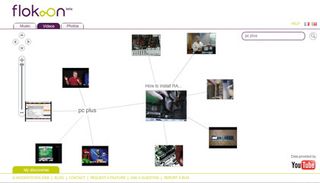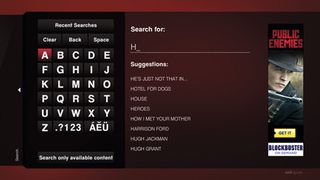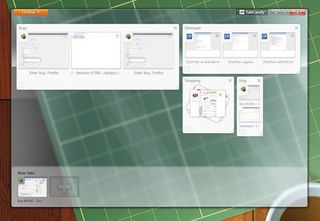11. Yummly - Semantic food search portal
www.yummly.com
There are a lot of sites out there that aggregate food recipes from around the web, but Yummly is one of the most powerful because of the way it's been programmed to understand semantic food connections like 'olive oil is found in Mediterranean cooking'.
You can filter the 500,000 recipes listed on the site by type of food, course, ingredients, allergies, nutritional values, price, cuisine, time and taste. It will even recalculate the amount of ingredients needed when cooking the recipe for different numbers of people.
12. Cpedia - Encyclopaedia pages populated by search term
www.cpedia.com
Imagine that instead of getting a numbered list of separate results on entering a search term, you got a magazine-like article containing all the information the search engine found on that topic. Well, that's the idea behind Cpedia, developed by ex-Google employees Anna Patterson and Russell Power.
In use, it's a bit hit and miss, with results becoming garbled as it tries to remove duplication from the various sources pulled in by your search term.
However, this does mean more original facts are pulled out in the report it generates than are apparent in a typical search, so as the algorithm develops, it really could revolutionise how we gather information from the web.
Get daily insight, inspiration and deals in your inbox
Get the hottest deals available in your inbox plus news, reviews, opinion, analysis and more from the TechRadar team.
13. Flokoon - Visual search for media
www.flokoon.com

Flokoon lets you explore the web in a more visual way than straight text searching. It's about media, pulling sounds from Last.fm, videos from YouTube and images from Fotolia.
The interesting thing is the way it displays those results. Using a hub-and-spokes visual representation that uses images to represent the artists/videos/songs, the relationships between the results are much easier to follow than regular descriptions could be.
14. TotalGuide EPG - Search via your TV
www.rovicorp.com

Who says you have to search using a computer or a phone? The latest televisions and set-top boxes come with their own hard drives and built-in connections to your PC, or direct to the web.
The latest Electronic Program Guides (EPGs) don't restrict themselves to showing you what's on TV now – they can access other devices and browse any media, be it video, picture or sound, from any connected source.
Rovi's TotalGuide is one of the most interesting. It can track content on online services, video on demand, cable and satellite services, social media networks and even storage devices around the home.
It also has a search feature called Six Degrees of Discovery, where you just highlight your favourite programmes or actors and let the EPG find similar content for you.
15. Hulu Captions Search - Video caption search
www.hulu.com/labs/captionssearch
Closed captions are the subtitles encoded into video for the deaf and hard of hearing, and they're included on most professionally made programmes and films. Sites such as YouTube are trialling systems that analyse the speech in video and automatically add closed captions.
These closed captions are timecoded text transcripts of what's being said, making them a useful data source to find particular phrases or subjects. Hulu, the US video-streaming site, has picked up on that and produced a closed captions search tool.
Say you want to find a particular quote in a TV series and jump straight to it – just type, for instance, "Ah, beer. The cause of and the solution to all of life's problems," and it will jump to the right minute of the right episode of The Simpsons so you can hear Homer say it.
It's in beta at the moment, and unfortunately Hulu remains a US-only service, but it may become a very powerful media-finding tool in the future.
16. Blinkx - Video search
www.blinkx.com
Blinkx uses a variety of techniques such as speech recognition, visual analysis and facial analysis to log as much information from videos as possible. It's been around for a while in website form, and has indexed some 35 million hours of video, but its creators have plans to make the jump to set-top boxes in the very near future.
Blinkx founder Suranga Chandratillake explained to our sister site TechRadar, "If you type in Marrakesh, then the search will pick up every time on travel programs that the city is mentioned, eventually building up a whole stack of content centred around one subject. You will be able to define what you are interested in and essentially create your own compilation clip show catering to your interests and needs."
17. Wikitude - Augmented reality encyclopaedia
www.wikitude.org
Wouldn't it be nice if, upon your arrival in a strange city, you could point your phone at a building and have it tell you something of the building's history and point out other places of interest around it?
Wikitude does exactly that, and it's becomiing more useful and powerful by the day. With 10,000 points of interest that mash up geolocation, augmented reality and Wikipedia entries, it surely won't be long before you can legitimately cancel the tour guides.
18. Monocle on Yelp - Augmented reality reviews
www.yelp.co.uk/yelpmobile
Yelp probably isn't a new name to you – it's a business review site with the mission "to connect people with great local businesses". And it's working – there are over 12 million user reviews on the site, covering services from restaurants and bars to mechanics and dentists.
What's new, though, are the Yelp phone apps, which use augmented reality to let you point your phone at a restaurant and be told what other people think about it. It will also let you know if there are any money-off vouchers available for nearby businesses, as well as guiding you to recommended places using a virtual map feature.
19. Nomao - Social-based personalised location search
http://uk.nomao.com
Instead of having to join a new site, it would be easier if you could just search your friends' recommendations on sites such as Twitter and Facebook. Nomao is one good place to do this.
It's a personalised, location-based social search engine that offers you "results based on what you like". It helps you find places like bars and restaurants based on previous places you've 'liked', on what your Facebook friends have 'liked' and from recommendations garnered from across the web.
It can display these results via augmented reality, so you can find recommended venues just by pointing your phone at likely contenders.
20. Panorama - Let your browser take the wheel
www.mozilla-europe.org/en/firefox

Panorama (formerly Tab Candy) is a feature coming to Firefox 4.0 in the near future that gets rid of the problem of losing track of a browser tab when you have lots open at once.
It enables you to pull out to see your tabs as screenshots in an Expose-style bird's-eye view. It also lets you organise tabs into labelled groups – say, 'Later reading' and 'Fun'. More interestingly though, it will enable you to share groups of tabs with your friends, and its search functionality lets you browse among your own tabs, your friends' recommended sites, and even those of strangers.
What's more, Panorama will provide links to other sites that are related to the subject being displayed on the tab you're on, be it similar subjects, similar pictures, prices or reviews for products you're looking at.
- 1
- 2
Current page: Recipe search, visual search, and more
Prev Page 20 search engines that do something differentMost Popular

